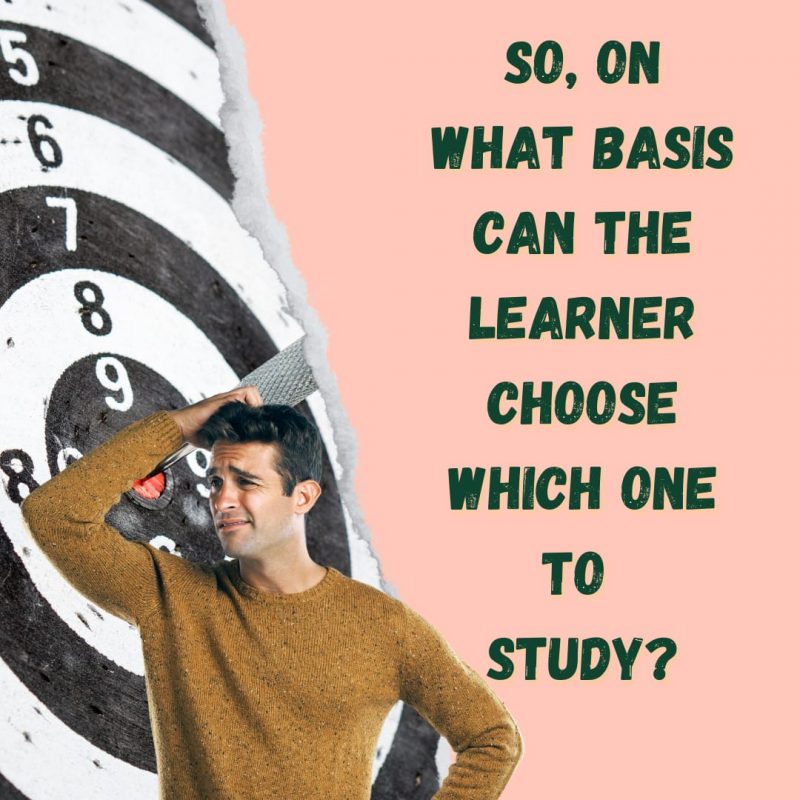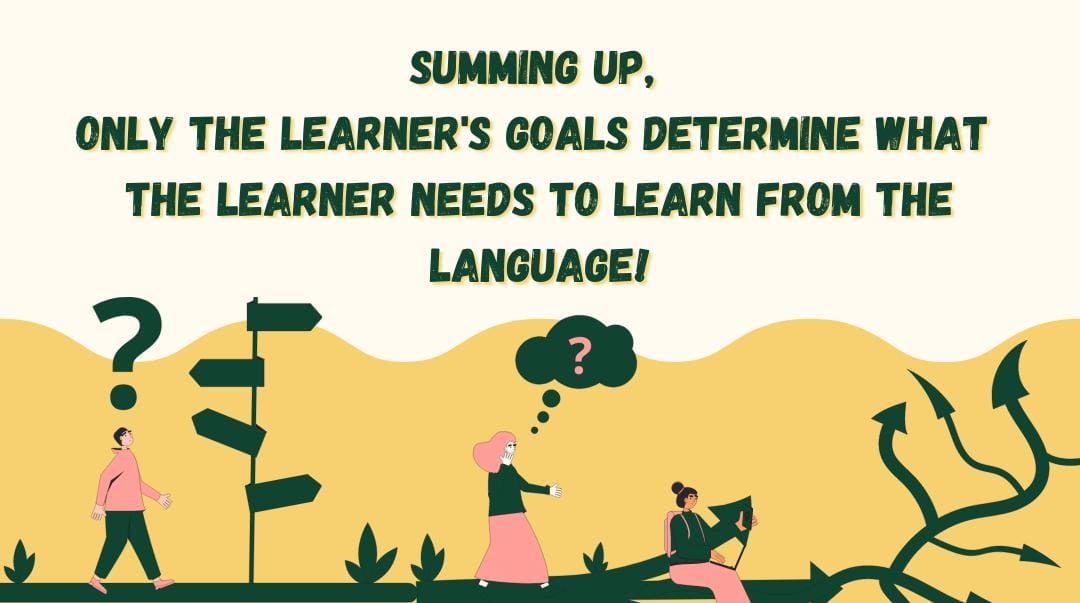Choosing between studying Fusha (MSA) or colloquial Arabic should not be based on an assumption that one is more important, or more widespread than the other. This is because they are two different linguistic forms. Both have two types of speech like many languages in the world, formal communication and, informal communication, each of which has a different significance, and both are equally widespread!


In fact, the learner’s goal of studying the language is what helps them decide on the variety of a language to learn. This means that the learner must define his goal precisely, and then the language specialist can tell them whether they need to study Fusha or colloquial Arabic. By the necessity of determining your goal here, we mean, defining the field of knowledge or the field in which the learner of Arabic wants to use the language, in addition to specifying the audience with which they will engage and deal with, and define the target place whether the learner interested about a particular country or in the Arab world in general.

Communication as a field of language learning may occur in different environments, such as communicating with ordinary people in everyday affairs, communicating with intellectuals on intellectual, philosophical, or life issues, or perhaps communicating with uneducated people who are out of touch with Standard Arabic. The learner may want to communicate with groups in a specific Arab region, whether in the Levant, the Gulf, Egypt, or the Maghreb, or interested in communicating with the Arabs in all Arab countries.

If their aim is to communicate with the uneducated people in a specific Arab country, then studying Fusha will never benefit them, while if they aim to deal with intellectuals in the entire Arab world and communicate with them in a formal context, then studying Fusha is more useful for the learner in this case. But if they want to communicate with the intellectuals in the everyday life; formal and informal and also deal with ordinary people in an everyday context, then studying Fusha alone will not help them, and the Colloquial Arabic alone will be insufficient to reach their goal, then they must combine learning Fusha with the Colloquial Arabic.
What must be determined in the field of communication must be determined in other fields. If you want to learn in order to work in the translation sector for example, then you must specify the type of translation: spoken or written, and the field in which language is used for translation whether it is a scientific, cultural, political, or social field. And the audience of which you will be translated to, are they intellectuals, scholars or common people, and the target country are you interested in; is it the entire Arab world or a specific country and so on. Every field, environment, and place has its requirements.

ما هو الأفضل ؟ أن أدرس الفصحى ؟ أم العامية؟
الاختيار بين دراسة العامية والفصحى لا يجب أن يكون مبنيّاً على أساس اعتقاد تفوّق إحداهما على الأخرى في الأهميّة، أو انتشار إحداهما أكثر من الأخرى؛ ذلك أنّنا نتحدّث عن قالبين لغويين يمثّلان مستويين مختلفين في اللغة العربية مثل كثير من لغات البشر: مستوى التواصل الفصيح الرسميّ ، ومستوى التواصل الدراج أو العاميّ، ولكلّ منهما أهميّةٌ مختلفةٌ، وكلاهما منتشرٌ بالقدر نفسه!
فعلى أيّ أساس يمكن للمتعلّم أن يختار ما يدرسه منهما؟
في الحقيقة هدف المتعلّم من دراسة اللغة هو الّذي سيساعده على اختيار ما يريد أن يتعلّمه، هذا يعني أنّ على المتعلّم أن يحدّد هدفه بدقّة، ويمكن بعد ذلك للمختصّ أن يخبره ما إذا كان يحتاج لدراسة الفصحى أو العاميّة. ونعني بالدقّة اللازمة في تحديد الهدف هنا: تحديد الحقل المعرفيّ او المجال الذي يريد المتعلّم للعربيّة أن يستخدم فيه اللغة، إضافة إلى تحديد المجموعات الخطابية الّتي سيتشارك معها النقاش ويتعامل معها باللغة، وتحديد المكان الّذي يستهدفه أي ما إذا كان المتعلّم يهتمّ ببلدٍ معيّنٍ او أنّه يهتمّ بكل الوطن العربيّ.
فالتواصل مثلاً كمجال من مجالات استخدام اللغة يمكن أن يكون في بيئات مختلفة، كالتواصل مع الأفراد العاديين في الشؤون الحياتيّة واليومية أو التواصل مع المثقّفين في قضايا فكريّة أو فلسفيّة أو حياتيّة، أو ربّما التواصل مع العوام غير المثقّفين البعيدين كلّ البعد عن اللغة العربية الفصحى. وقد يريد المتعلّم التواصل مع مجموعاتٍ في بلدٍ عربيّ بعينه سواء أكان من دول الشام أو الخليج أو مصر او المغرب العربيّ أو يريد التواصل مع العرب في كلّ البلاد العربيّة.
كلّ هذه المحدّدات عندما يضعها المتعلم تساعد في توجيهه إلى ما يتوجّب عليه دراسته. فإن كان يريد التعامل مع البيئات غير المتعلّمة في بلد عربيّ محدّد فلن تفيده أبداً دراسة الفصحى، بينما إذا كان يستهدف التعامل مع المثقّفين في الوطن العربيّ كلّه والتواصل معهم في سياق رسميّ فالفصحى أجدى للمتعلّم في هذه الحالة. لكن إذا كان يريد أن يتواصل مع المثقفين في مختلف المواقف الرسمية وغير الرسمية إضافة إلى التعامل مع أفراد عاديين في سياقات عاديّ، فالفصحى وحدها لا تساعده ، والعاميّة وحدها ستكون قاصرةً عن إبلاغه هدفه، فعليه حينئذٍ أن يجمع بين تعلّم الفصحى وتعلّم العاميّة .
وما يجب تحديده في مجال التواصل يجب تحديده في المجالات الأخرى، فمن يريد التعلّم من أجل العمل في الترجمة عليه أن يحدّد نوع الترجمة: منطوقة أم مكتوبة، والمجال الّذي يستخدم اللغة للترجمة فيه مجال علمي أو ثقافيّ أو سياسيّ أو اجتماعيّ . والمجموعة التي سيترجم لها : أهم المثقفون أم العلماء أم عامة الناس، والبلد التي يستهدفها أهو يريد كلّ الوطن العربيّ ام يستهدفُ بلداً آخر. وهكذا، ولكلّ مجال وبيئةٍ ومكانٍ احتياجاته.
الخلاصة هي: أهداف المتعلّم هي فقط من تحدّد ما يحتاج المتعلّم تعلّمه من اللغة!

